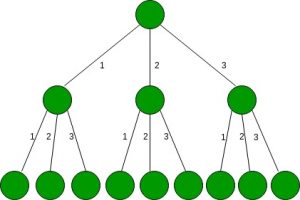给定一个K进制树,其中每个节点都有K个子节点,每个边都有一定权重。从特定节点到其所有子节点的所有边缘(即K)的权重按升序1、2、3,…,K求。总权重为W的路径数(路径中所有边缘权重的总和) )从根开始,并至少包含一个重量至少为M的边。
例子:
输入: W = 3,K = 3,M = 2输出: 3说明:一条路径可以是(1 + 2),第二条路径可以是(2 + 1),第三条路径可以是3。  输入: W = 4,K = 3,M = 2输出: 6
输入: W = 4,K = 3,M = 2输出: 6
方法:可以使用动态编程方法解决此问题。这个想法是要保持两种状态,一种状态是当前重量的要求,另一种状态是布尔变量的,这表明当前路径是否包括了一条至少有权重M的边缘。迭代所有可能的边缘权重,即K,并递归求解权重W – i,满足1≤i≤K的要求。如果当前边缘权重大于或等于M,则将下一个调用的布尔变量设置为1。
下面是上述方法的实现。
C++
// C++ program to count the number of
// paths with weight W in a K-ary tree
#include
using namespace std;
// Function to return the number of ways
// having weight as wt in K-ary tree
int solve(int dp[][2], int wt, int K, int M,
int used)
{
// Return 0 if weight becomes less
// than zero
if (wt < 0)
return 0;
if (wt == 0) {
// Return one only if the
// current path has included
// edge weight of atleast M
if (used)
return 1;
return 0;
}
if (dp[wt][used] != -1)
return dp[wt][used];
int ans = 0;
for (int i = 1; i <= K; i++) {
// If the current edge weight
// is greater than or equal to
// M, set used as true
if (i >= M)
ans += solve(dp, wt - i,
K, M, used | 1);
else
ans += solve(dp, wt - i,
K, M, used);
}
return dp[wt][used] = ans;
}
// Driver Code to test above function
int main()
{
int W = 3, K = 3, M = 2;
int dp[W + 1][2];
memset(dp, -1, sizeof(dp));
cout << solve(dp, W, K, M, 0) << endl;
return 0;
} Java
// Java program to count the number of
// paths with weight W in a K-ary tree
class GFG
{
// Function to return the number of ways
// having weight as wt in K-ary tree
public static int solve(int[][] dp, int wt,
int K, int M, int used)
{
// Return 0 if weight becomes less
// than zero
if (wt < 0)
{
return 0;
}
if (wt == 0)
{
// Return one only if the
// current path has included
// edge weight of atleast M
if (used == 1)
{
return 1;
}
return 0;
}
if (dp[wt][used] != -1)
{
return dp[wt][used];
}
int ans = 0;
for (int i = 1; i <= K; i++)
{
// If the current edge weight
// is greater than or equal to
// M, set used as true
if (i >= M)
{
ans += solve(dp, wt - i,
K, M, used | 1);
}
else
{
ans += solve(dp, wt - i,
K, M, used);
}
}
return dp[wt][used] = ans;
}
// Driver Code
public static void main(String[] args)
{
int W = 3, K = 3, M = 2;
int[][] dp = new int[W + 1][2];
for (int i = 0; i < W + 1; i++)
{
for (int j = 0; j < 2; j++)
{
dp[i][j] = -1;
}
}
System.out.print(solve(dp, W, K, M, 0) + "\n");
}
}
// This code has been contributed by 29AjayKumarPython3
# Python 3 program to count the number of
# paths with weight W in a K-ary tree
import numpy as np
# Function to return the number of ways
# having weight as wt in K-ary tree
def solve(dp, wt, K, M, used) :
# Return 0 if weight becomes less
# than zero
if (wt < 0) :
return 0
if (wt == 0) :
# Return one only if the
# current path has included
# edge weight of atleast M
if (used) :
return 1
return 0
if (dp[wt][used] != -1) :
return dp[wt][used]
ans = 0
for i in range(1, K + 1) :
# If the current edge weight
# is greater than or equal to
# M, set used as true
if (i >= M) :
ans += solve(dp, wt - i,
K, M, used | 1)
else :
ans += solve(dp, wt - i,
K, M, used)
dp[wt][used] = ans
return ans
# Driver Code
if __name__ == "__main__" :
W = 3
K = 3
M = 2
dp = np.ones((W + 1, 2));
dp = -1 * dp
print(solve(dp, W, K, M, 0))
# This code is contributed by RyugaC#
// C# program to count the number of
// paths with weight W in a K-ary tree
using System;
class GFG
{
// Function to return the number of ways
// having weight as wt in K-ary tree
public static int solve(int[,] dp, int wt, int K, int M, int used)
{
// Return 0 if weight becomes less
// than zero
if (wt < 0)
return 0;
if (wt == 0) {
// Return one only if the
// current path has included
// edge weight of atleast M
if (used == 1)
return 1;
return 0;
}
if (dp[wt,used] != -1)
return dp[wt,used];
int ans = 0;
for (int i = 1; i <= K; i++) {
// If the current edge weight
// is greater than or equal to
// M, set used as true
if (i >= M)
ans += solve(dp, wt - i,
K, M, used | 1);
else
ans += solve(dp, wt - i,
K, M, used);
}
return dp[wt,used] = ans;
}
// Driver Code to test above function
static void Main()
{
int W = 3, K = 3, M = 2;
int[,] dp = new int[W + 1,2];
for(int i = 0;i < W + 1; i++)
for(int j = 0; j < 2; j++)
dp[i,j] = -1;
Console.Write(solve(dp, W, K, M, 0) + "\n");
}
//This code is contributed by DrRoot_
}输出:
3
时间复杂度: O(W * K)